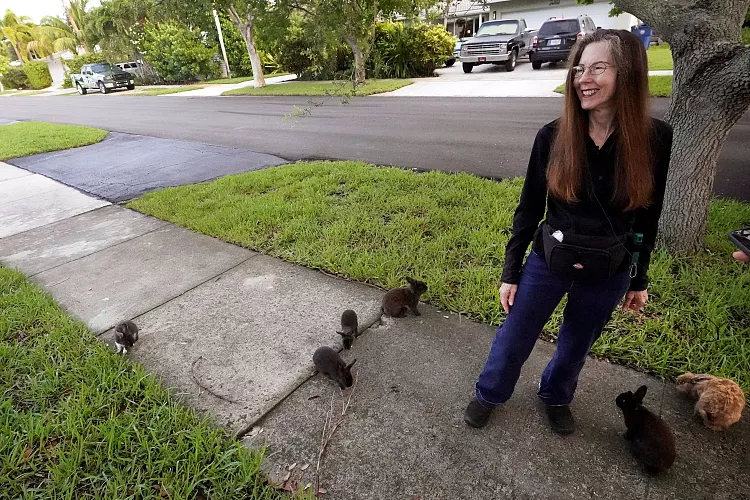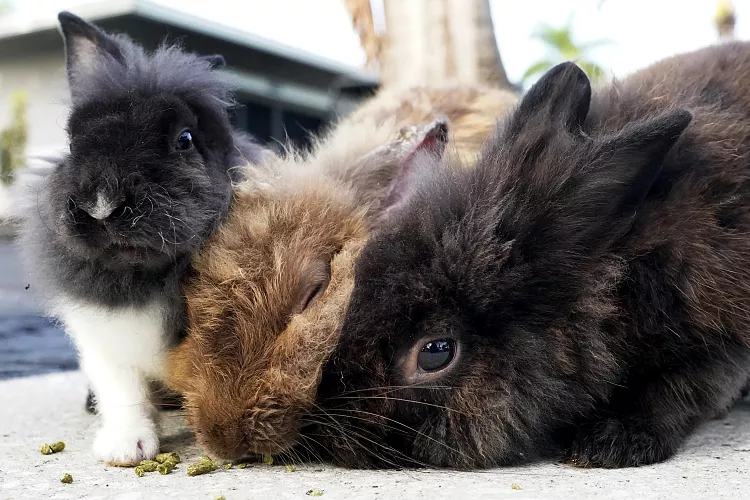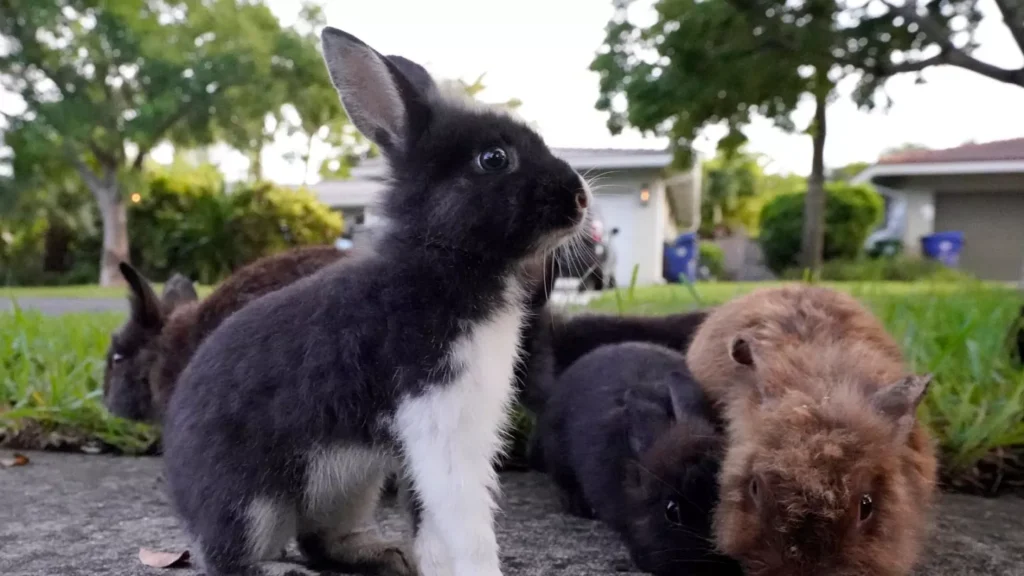A new fluffy invasion is captivating the attention of a suburb in Fort Lauderdale, Florida, as lionhead rabbits join the ranks of invasive species in the region. The lionhead rabbits, characterized by their impressive flowing manes, have become a common sight in the Jenada Isles community in Wilton Manors. With an estimated population of 60 to 100, these domesticated rabbits are the descendants of a group that was released by a backyard breeder two years ago.
When residents, led by Alicia Griggs, step outside their homes, they are greeted by the sight of lionhead rabbits hopping down the streets, seeking food from passersby. Griggs, who has taken on the responsibility of addressing the issue, represents the rabbits’ best chance of survival. The suburban environment poses various risks to these domesticated rabbits, including traffic hazards, predation by cats and hawks, exposure to the Florida heat, and the potential intervention of government-hired exterminators.
Efforts to address the lionhead rabbit invasion involve raising funds ranging from $20,000 to $40,000 to cover the costs of a rescue group. The group would be tasked with capturing, neutering, vaccinating, sheltering, and eventually rehoming the rabbits. The funds are crucial for managing the estimated 60 to 100 lionheads that have taken up residence in Jenada Isles.
The origin of this fluffy invasion traces back to a backyard breeder who illegally released the rabbits when she moved away two years ago. Griggs, in her mission to rescue the lionheads, faces challenges in convincing the city to take action promptly. She expresses frustration at the city’s reluctance, suggesting that there may be concerns about addressing the lionhead issue leading to similar actions for other unwanted species like iguanas.
The invasion of lionhead rabbits in this suburban enclave sheds light on the complexities of managing invasive species in urban environments. Griggs and the residents are navigating not only the practical challenges of capturing and rehoming the rabbits but also the bureaucratic hurdles associated with seeking assistance from local authorities. The story underscores the delicate balance communities must strike when dealing with invasive species, considering the welfare of the animals while addressing potential ecological and environmental concerns.

Monica Mitchell, representing the East Coast Rabbit Rescue organization, the likely leader in the rescue effort, emphasizes that capturing, treating, and finding homes for the lionhead rabbits is a challenging process. Rabbit veterinarians are scarce, and potential owners often shy away upon learning about the considerable effort required for their care.
Griggs echoes these sentiments, highlighting that people often underestimate the complexities of caring for exotic pets like lionhead rabbits. Their intricate digestive systems and specific dietary needs make them unique companions, requiring dedicated attention. Griggs, a real estate agent, emphasizes, “You can’t just throw any table scraps at them.”
Despite concerns raised by some residents about the rabbits causing damage to property and posing potential hazards, Wilton Manors has granted Griggs and other advocates time to raise funds and relocate the rabbits rather than opting for extermination. The city commission’s initial decision to exterminate was prompted by complaints of the lionheads digging holes, chewing outdoor wiring, and leaving droppings, coupled with fears of potential traffic hazards if they ventured onto major streets or spread into neighboring communities.
Police Chief Gary Blocker emphasizes the city’s commitment to ensuring the safety and well-being of the rabbit population, indicating that any decision to intervene will prioritize placing the rabbits in the care of individuals passionate about providing the necessary attention and love for their well-being. The Florida Fish and Wildlife Conservation Commission has stated that the lionhead rabbits pose no immediate threat to wildlife and has opted not to intervene in the matter. The ongoing saga of the lionhead rabbits in Wilton Manors underscores the challenges and complexities communities face when dealing with invasive species, balancing concerns of residents with the welfare of the animals involved.

Florida is grappling with a variety of invasive species causing challenges for residents. The notorious Giant African snails, known for eating stucco off homes and carrying diseases harmful to humans, pose a threat. Additionally, iguanas wreak havoc in gardens, adding to the state’s invasive species woes. Importantly, these populations all originated from illegal releases into the environment.
Unlike some invasive species, the Florida environment is unforgiving to lionhead rabbits. Their thick coats make them prone to overheating in the state’s intense summers, and their lack of fear makes them easy prey for predators. Surviving on lawns is not a suitable diet, and their untreated illnesses highlight the need for proper care. The inherent domestication of rabbits makes them ill-equipped to thrive independently in the wild, emphasizing the responsibility of their owners.
Eric Stewart, the executive director of the American Rabbit Breeders Association, advocates for the prosecution of the breeder who released the rabbits. Despite the challenges, the lionhead rabbit colony in Wilton Manors persists and grows due to their prolific breeding habits, with females giving birth to litters every month.
While some residents find joy in the presence of these rabbits, others face practical challenges. Jon King, for instance, expresses frustration as the rabbits dig in his yard, causing damage and requiring repairs. The coexistence between residents and the rabbits reflects both appreciation and inconvenience, sparking a conversation about the impact of invasive species and the importance of responsible ownership.
